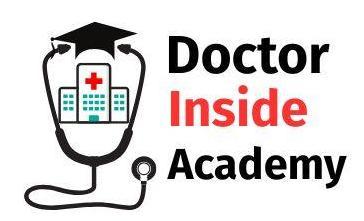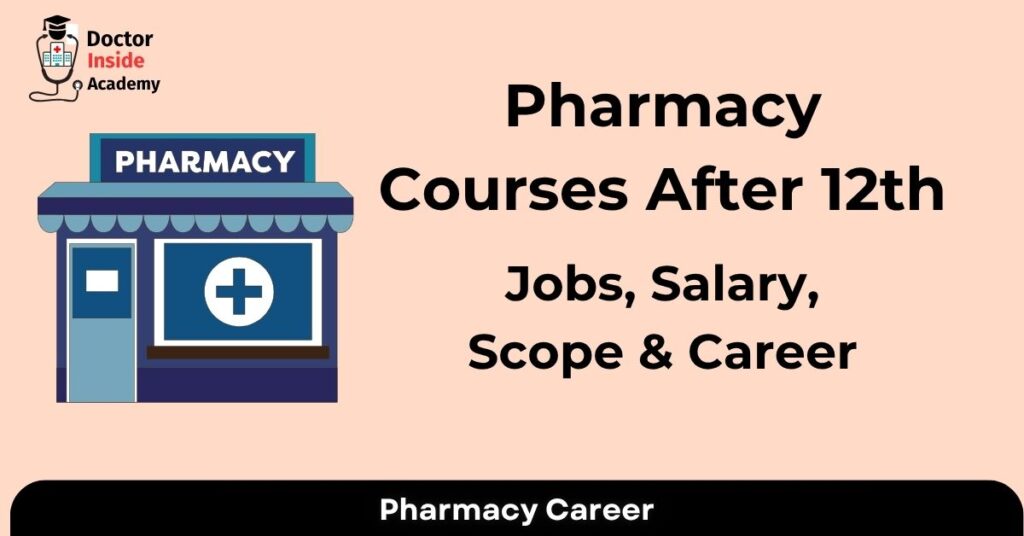After the 12th grade, medical students can build their careers in pharmacy. Instead of MBBS or BDS, students can choose a Diploma in Pharmacy or a B.Pharm. Due to the fast growth of the Indian pharmaceutical industry, there is an increasing demand for pharmacy specialists every year.
There is a continuous demand for skilled pharmacists in this industry, and there are many specialized pharmacy courses available. You can enter this field without any doubt if you are considering pursuing it to pursue. Simply enroll in pharmacy degree programs right now, at nearby PCI-approved pharmacy colleges or universities.
A pharmacist’s job is to supply medications as directed by a licensed healthcare provider. In a pharmaceutical company, pharmacists work in areas such as drug audits, production, supply, quality control, and much more.
Types of Pharmacy Courses
In order to pursue a career in pharmacy, candidates must have finished their 12th grade with PCB or PCM. One can enroll in the following course after the 12th:
Here are a few different types of pharmacy courses:
| Name of Course | Duration | Type |
| Diploma in Pharmacy | 2 Years | Diploma |
| B.Pharm | 4 Years | Degree |
| Pharm D | 6 Years | Doctorate |
| B.Pharma LEET | 3 Years(Lateral) | Graduation |
| B. Pharm (Practice) | 2 Years | Under Graduation |
| Masters of Pharmacy(Pharmaceutics) | 2 Years | Post Graduation |
Here is a detailed pharmacy course list:
Diploma in Pharmacy (D.Pharm)
The general duties of pharmacists are covered in a two-year pharmacy diploma curriculum. Students who want to get more practical experience and get ready for the workforce prefer this course. But with a shorter course length than a B.Pharmacy course.
For D. Pharma, you must normally have passed your 10+2 (or equivalent) exam in a science stream with physics, chemistry, and either biology or mathematics, and you must have a minimum aggregate score of at least 50%.
Bachelor of Pharmacy (B. Pharm)
After completing the 12th grade, the best pharmacy program is the Bachelor of Pharmacy, which takes 4 years to complete in India. Human anatomy and the physiological effects of various drugs are covered in this B Pharm course. The syllabus blends with practical approach with academic exposure.
One might pursue post-graduate pharmacy courses to further their education in this area after graduation.
Master’s in Pharmacy (M.Pharm)
A postgraduate pharmacy degree known as a Master of Pharmacy (M.Pharm) usually lasts 2 years and provides extensive knowledge and research abilities in fields such as medication formulation, development, and evaluation.
Doctorate in Pharmacy (Pharm.D)
5 years of coursework and a year-long internship make up the 6-year Doctor of Pharmacy curriculum. Those who want to learn and be successful in the pharmaceutical industry are Pharm D prospects. Students who complete Pharma D can pursue a wide range of careers, such as those for research scientists, quality assurance managers, and pharmacists.
B Pharma and D Pharma Difference
The 4 years of Bachelor of Pharmacy (B. Pharma) program offers a detailed understanding of pharmaceutical sciences, while the 2 years of Diploma in Pharmacy (D. Pharma) program focuses on fundamental pharmacy skills needed for entry-level positions.
Here’s a more detailed comparison:
| Features | B. Pharma | D Pharma |
| Duration | 4 Years | 2 Years |
| Focus | Comprehensive knowledge of pharmaceutical sciences, including drug formulation, medicinal chemistry, and pharmacology | Basic pharmaceutical sciences and practical skills for pharmacy settings |
| Career Paths | Pharmacist, researcher, industry professional, quality control, drug development, and management roles | Pharmacy technician, dispenser, pharmacy assistant |
| Course Content | Wider range of subjects, including biochemistry, pharmacology, pharmaceutics, and industrial pharmacy. | Focus on basic principles of pharmacy and practical skills. |
| Entry into the Workforce | Requires more time for education, but opens doors to diverse career paths | Faster entry into the workforce, ideal for those seeking immediate employment |
Pharmacy Course Eligibility
Candidates who wish to enroll in pharmacy studies after completing their 12th grade must fulfill the following fundamental eligibility requirements:
- Passed 10+2 (PCM) or (PCB) from any recognised board or university.
- Must score a minimum of 45% marks in qualifying subjects.
- When applying for admission, the applicant must be at least 17 years old.
When it comes to eligibility and prerequisites for pharmacy courses, these three guidelines are essential.
Common entrance examinations used for admissions include the National Eligibility cum Entrance Test (NEET), University-Specific Entrance examinations, State-Level Common Entrance Tests (CETs), AP EAMCET, GPAT, and WBJEE.
Fees of Pharmacy Courses
The cost of these pharmacy courses after 12th grade varies by university. For additional help, give +91 8607899999 a call right now!
Admission Process of Pharmacy Courses
Your application’s university will determine the admissions process. Additionally, the university determines the entry exam or cut-off. Some states have their tests, while other colleges have their own as well.
Here is a brief about the admission process of pharmacy courses, are:
- The admission to the pharmacy courses is based on a state-level entrance exam conducted by the state medical authority.
- Some universities also offer admission based on 12th-grade marks.
- For PG courses, candidates have to qualify pharmacy aptitude test conducted at the national level, known as GPAT.
- The GPAT exam is conducted by NTA; the application form for the same is available from the first week of November every year.
- After qualifying for the exam, candidates have to appear in the counselling process.
Pharmacy Jobs and Salary in India
The pharmacy has a vast scope both in India and elsewhere. The pharmaceutical industry needs qualified workers to meet the increasing demand for medications and pharmaceuticals needed by healthcare facilities.
After earning your pharmacy degree, your starting salary might be between ₹2.5 lakh and ₹4 lakh per year. Your salary will increase steadily as your industry knowledge and skill level increase.
There are many opportunities in this field because a pharmacy degree can lead to employment in pharmaceutical companies, as a tutor, as an independent certified pharmacy store manager, etc. You can learn more about the courses available in the section below.
Brief Presentation of Pharmacy Jobs and Salary in India
| Job Roles | Average Salary |
| Pharmacist | Rs. 2.8 LPA |
| QC Inspector | Rs. 2.8 LPA |
| Research Associate | Rs. 4.7 LPA |
| Drug Inspector | Rs. 4.9 LPA |
| Chemist | Rs. 3.1 LPA |
| Teacher | Rs. 2.8 LPA |
Note: These are the average salaries with relevant job roles. (Just for educational purposes only).
Career After Pharmacy Courses
In India, pharmacy students can build their careers in a variety of pharmacy-related industries.
By entering this field, you can choose from a wide range of career paths and mold your future along the one that most interests you. These are some of the most sought-after careers for recent grads.
Here is the list of a few pharmacy student jobs:
- Chemist
- Pharmacist
- Food Analyst
- Health Inspector
- Research Associate
- Medical Representative
- Quality Control Executive
- Quality Assurance Executive
- Universities/Colleges Educator
- Pharmacy Shop/Store Manager or Owner
- Pharmacy Professional in Hospitals & Nursing Care
Last Words
The highly lucrative field of pharmacy offers a wide range of opportunities; it is up to you how you choose to pursue it. Consider every aspect before enrolling in pharmacy degree programs. You can explore the list of top pharmacy schools and tailor the course to your needs by choosing Pharmacy Courses & Programs.
FAQ Related to Pharmacy Courses After 12th
What is a pharmacy course?
A pharmacy course is a type of academic program that instructs students about drug development, healthcare, and medications. Students can get ready for jobs in academics, research, and healthcare by taking pharmacy courses.
In addition to academic and practical training, pharmacy courses incorporate clinical research and study. Learners learn about diseases, drug classes, and the physiological effects of prescription drug ingredients.
What are the core subjects covered in pharmacy courses after the 12th?
Pharmacology, pharmaceutics, pharmaceutical chemistry, biochemistry, and other subjects are the most often taught subjects in pharmacy courses after the 12th grade.
What are the pharmacist’s qualifications?
In India, you normally need to get a Bachelor of Pharmacy (B. Pharm) or Doctor of Pharmacy (Pharm.D) degree before registering with the Pharmacy Council of India (PCI) to become a registered pharmacist.
What degree is required to open a medical store?
In India, being the owner or an assigned pharmacist of a medical shop or store requires a Bachelor of Pharmacy (B. Pharm) or a Diploma in Pharmacy (D. Pharm) from an accredited college.
What are the best career options after 12th science?
Following the conclusion of the science-focused 12th grade. A B. Pharmacy degree is an option for you to pursue. As the pharmaceutical industry’s need continues to grow, you have a fantastic opportunity to advance your career in this field.
Which university is best for B. Pharm?
There are many B. Pharm universities in India. To know more, Contact Doctor Inside Academy Counselors today.
Can I pursue pharmacy after 12th PCB?
After finishing your 12th-grade coursework in Physics, Chemistry, and Biology (PCB), you can pursue a career in pharmacy (B. Pharm).


